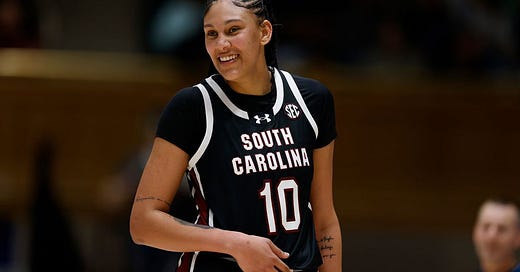I Am Not The Villain You Want Me To Be
"The Giant Brazilian woman from South Carolina that knocks people over"
A comment made by CBS Sports about "giant Brazilian woman from South Carolina that knocks people over" has sparked outrage and rightfully so. The comment was made about South Carolina Student-Athlete, Kamilla Cardoso.
LSU vs. South Carolina : SEC Tournament
The recent incident during the SEC tournament final between LSU and South Carolina has brought attention to the intensity and passion within women's basketball. Despite South Carolina's success in clinching their eighth SEC tournament title, the game was marred by an on-court altercation that escalated tensions between the teams.
The altercation began with a deliberate foul by LSU's Flau'jae Johnson against South Carolina's MiLaysia Fulwiley, sparking a physical confrontation between Johnson and South Carolina's Ashlyn Watkins. The situation escalated further when Kamila Cardoso pushed Johnson to the ground, leading to both benches clearing and multiple players being ejected from the game.
The fallout from the incident ignited a fiery debate among fans, with emotions running high on social media platforms such as Twitter, Facebook and Instagram. Supporters of both LSU and South Carolina passionately defended their teams while condemning the actions of the opposing players. Discussions on online forums and sports discussion groups delved into various aspects of the altercation, including concerns about sportsmanship, player conduct, and the role of referees and officials in managing on-court conflicts.
This incident underscores the importance of media representation in shaping the narrative surrounding women's sports. While moments of intensity are inevitable in competitive sports, it is crucial for commentary to be approached with sensitivity and respect for the diverse talents and contributions of female athletes. By recognizing the complexity of the game and the skill of the players involved, media outlets can help promote a more positive and inclusive portrayal of women's sports.
The Role of Media
The role of media in shaping perceptions and narratives within the sports world cannot be overstated. Media coverage influences how audiences perceive athletes, teams, and entire sports leagues, ultimately impacting their popularity, sponsorship opportunities, and overall growth. However, when it comes to women's basketball, the media often falls short, perpetuating harmful stereotypes and neglecting the immense talent and athleticism of female athletes.
The recent comment made by CBS Sports about Kamilla Cardoso serves as a poignant example of this issue. By describing her as a "giant Brazilian woman from South Carolina that knocks people over," the comment reduces Cardoso to mere physical attributes, disregarding her skills, dedication, and talent as a basketball player. This reductionism not only undermines Cardoso's individual achievements but also perpetuates harmful stereotypes about female athletes.
Referring to Cardoso as a "giant" implies that her value as a player stems solely from her size, overlooking the multifaceted qualities that make her an exceptional athlete. Furthermore, mentioning her nationality in a casual manner reinforces the notion that her Brazilian heritage somehow defines her playing style or abilities, rather than acknowledging her as a talented athlete in her own right.
The phrase "knocks people over" further diminishes Cardoso's abilities by emphasizing brute force over skill and finesse. This characterization not only oversimplifies her playing style but also reinforces outdated stereotypes about women's sports being less about athleticism and more about physicality.
Moreover, by focusing on Cardoso's physical attributes and nationality, CBS Sports missed an opportunity to highlight her achievements, skills, and contributions to her team. Cardoso is not simply a "giant Brazilian woman"; she is a skilled basketball player who has earned her place on the court through hard work and dedication. Ignoring these aspects of her identity perpetuates the marginalization of female athletes in the media and undermines their accomplishments.
This incident serves as a reminder of the challenges that women's sports face in gaining recognition and respect in the media. Moving forward, it is imperative for media outlets to approach coverage of women's sports with respect and a focus on highlighting the incredible talent and athleticism of female athletes. By doing so, the media can help challenge stereotypes, promote inclusivity, and contribute to the continued growth and success of women's sports on a global scale.




